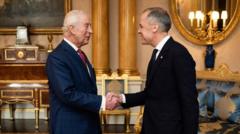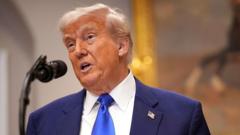In response to President Donald Trump's announcement of a potential 50% tariff on EU imports, the European Union stands firm on the principles of mutual respect and cooperation in trade discussions. EU Trade Commissioner Maros Sefcovic emphasized the bloc's commitment to securing a beneficial trade agreement, urging that "EU-US trade must be guided by mutual respect, not threats." This comes after Trump expressed frustration with the progress of ongoing negotiations, underscoring his plan to implement higher tariffs starting June 1.
EU Responds Firmly as Trump Threatens 50% Tariffs on Imports

EU Responds Firmly as Trump Threatens 50% Tariffs on Imports
The European Union's trade chief emphasizes mutual respect in trade negotiations amidst escalating tariff threats from the US.
On Friday, Trump took to social media, stating, "Our discussions with [the EU] are going nowhere," while asserting that tariffs would apply to EU goods but not to domestically manufactured products. He further implied that he might reconsider the imposition of tariffs if a European company made a significant investment in the US.
The EU, as a key trading partner for the United States, accounted for over $600 billion in goods trade last year. European leaders have been vocal in their opposition to higher tariffs, highlighting the negative repercussions that such measures would have on both economies. Irish Taoiseach Micheál Martin urged for sustained negotiations rather than escalation, while French Trade Minister Laurent Saint-Martin echoed the call for de-escalation.
Meanwhile, German Economy Minister Katherina Reiche stressed the importance of finding a viable solution with the US, a sentiment echoed by Dutch Prime Minister Dick Schoof, who reinforced support for the EU's approach in ongoing discussions. As the EU collectively negotiates with the US, there have been suggestions that individual countries may pursue their independent arrangements.
In previous months, Trump had enacted tariffs on a range of countries, including a 20% tax on most EU goods, which he temporarily paused to facilitate further discussions. However, a baseline tax of 10% remains in effect, impacting trade relationships extensively.
Alongside the looming tariff threats, the EU has also discussed potential retaliatory measures, including a 25% tariff on $20 billion worth of US products, although these plans have been suspended for the time being.
President Trump has continuously pointed to an unsatisfactory trade balance with Europe, claiming it unfairly supports European companies over American ones, particularly in sectors such as automotive and agriculture. His remarks have contributed to fluctuations in market shares, with notable declines for US and European indices following the announcement of potential tariffs.
The EU, as a key trading partner for the United States, accounted for over $600 billion in goods trade last year. European leaders have been vocal in their opposition to higher tariffs, highlighting the negative repercussions that such measures would have on both economies. Irish Taoiseach Micheál Martin urged for sustained negotiations rather than escalation, while French Trade Minister Laurent Saint-Martin echoed the call for de-escalation.
Meanwhile, German Economy Minister Katherina Reiche stressed the importance of finding a viable solution with the US, a sentiment echoed by Dutch Prime Minister Dick Schoof, who reinforced support for the EU's approach in ongoing discussions. As the EU collectively negotiates with the US, there have been suggestions that individual countries may pursue their independent arrangements.
In previous months, Trump had enacted tariffs on a range of countries, including a 20% tax on most EU goods, which he temporarily paused to facilitate further discussions. However, a baseline tax of 10% remains in effect, impacting trade relationships extensively.
Alongside the looming tariff threats, the EU has also discussed potential retaliatory measures, including a 25% tariff on $20 billion worth of US products, although these plans have been suspended for the time being.
President Trump has continuously pointed to an unsatisfactory trade balance with Europe, claiming it unfairly supports European companies over American ones, particularly in sectors such as automotive and agriculture. His remarks have contributed to fluctuations in market shares, with notable declines for US and European indices following the announcement of potential tariffs.


















